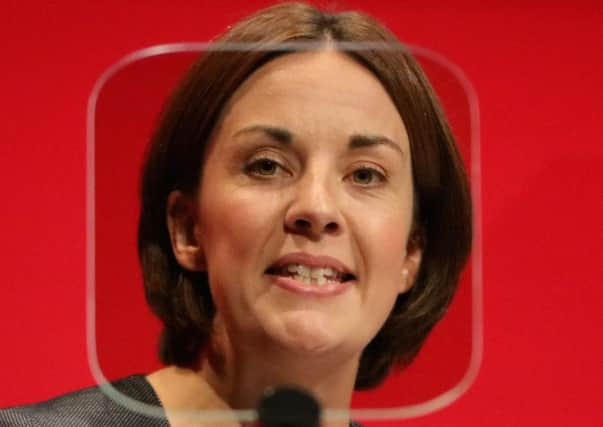Tom Peterkin: Kez shines but still has to overcome the Jez factor


The consolidation of Jeremy Mr Corbyn’s position at the top of the UK Labour Party has left Kezia Dugdale on a sticky wicket.
Her invidious position arises from the refreshing but perhaps naïve candour with which she has made her views on Mr Corbyn plain.
Advertisement
Hide AdAdvertisement
Hide AdDugdale publicly backed Owen Smith’s doomed attempt to wrest the leadership from Mr Corbyn – a position that will inevitably raise questions about her loyalty to the leader.
Furthermore, she has also spoken of Mr Corbyn in less than flattering terms – suggesting in the past that he should quit and questioning whether he is capable of winning a general election.
So how on earth can the Kez and Jez relationship flourish when Kez so clearly believes Jez is the wrong choice?
Part of the answer has to be that she must dispel the idea – so damagingly propagated by one of her predecessors Johann Lamont – that Scottish Labour is a mere “branch office” of London.
And utterly fundamental to Ms Dugdale’s desire to establish the Scottish party as a fully autonomous organisation were the reforms that were considered at the UK conference this week.
The conflict between Ms Dugdale and Mr Corbyn on this issue underlined just how difficult the Kez and Jez dynamic is. The attempt by Mr Corbyn and his allies to block those reforms could have proved incredibly difficult for the Scottish Labour leader.
Therefore there was huge relief from Ms Dugdale and her team that she emerged as victor in this crucial internal contest.
At stake was a key package of reforms that conference was voting on and which would define how the Scottish party operates in the future.
Advertisement
Hide AdAdvertisement
Hide AdA fundamental aspect of the reforms was a proposal to transfer the power over candidate selection for House of Commons seats and the ability of the Scottish party to make its own policy on areas like defence which remain under Westminster control.
Another part of the package was a proposal to allow Dugdale and the party’s Welsh leader Carwyn Jones to appoint a representative on to National Executive Committee (NEC).
It was the idea of having representatives from the Celtic nations on the party’s ruling body which caused consternation amongst the Corbynistas. Their fear was that allowing representatives from Scotland and Wales could tip the balance of the NEC in favour of those who did not support Mr Corbyn.
Some trade unions argued that opening up the NEC to appointees was anti-democratic and candidates should have been selected via a party vote.
They were countered by those who believed their objections were motivated by a wish to limit the opportunities for anti-Corbyn moderates to sit on the NEC.
It was, by any standards, a huge battle for Ms Dugdale and it is greatly to her credit that she emerged triumphant.
Lest anyone was in any doubt about just how crucial this battle was, it should be remembered how it was characterised by Scotland’s only Labour MP the day before conference voted on it.
Ian Murray, the former shadow Scottish secretary and MP for Edinburgh South, said: “If certain people on the National Executive Committee run a campaign to vote these rules down tomorrow they are in danger of not just not helping the Scottish Labour Party, they are in danger of shutting the Scottish Labour Party down.”
Advertisement
Hide AdAdvertisement
Hide AdSince her elevation to the top job in Scottish Labour, it has become apparent that Ms Dugdale is a likeable and passionate politician. The question mark was whether this affable individual had the mettle to succeed in the cruel and back-biting world of politics.
This victory would suggest that she, and her supporters, have the tenacity required to take on Mr Corbyn and carve out a distinctively Scottish path for the party north of the Border.
Those who are desperate for Ms Dugdale to turn round the fortunes of Labour in Scotland can take heart from reports of a meeting prior to the conference vote at which the reforms were discussed with Mr Corbyn. “How dare you preach unity and then try to undermine me as Scottish leader,” an incandescent Dugdale is said to have scolded Mr Corbyn.
The evidence of fire in the Dugdale belly is encouraging, but it fails to mask that she still faces enormous challenges.
The bald truth is that no matter this week’s victory Ms Dugdale’s attempts to distance the Scottish party from Mr Corbyn do not address her overall problem. She is damned by her association – no matter how slim she attempts to make it – with a dysfunctional and deeply divided organisation and a leader with whom she is at odds.
By all accounts the mood at conference in Liverpool was flat.
The moderate wing of the party are in despair now that Mr Corbyn has cemented his position at the head of the party.
After the failure of Smith to topple Mr Corbyn, the chances of a more credible leadership challenge have ebbed away and now seem non-existent. The party may be in rude health in terms of the influx of membership, but its lurch to the left means it is on life support in terms of electoral relevance.
As the weeks and months go by Ms Dugdale will have to show much more of the resilience and determination that was on display at this week’s Labour conference.